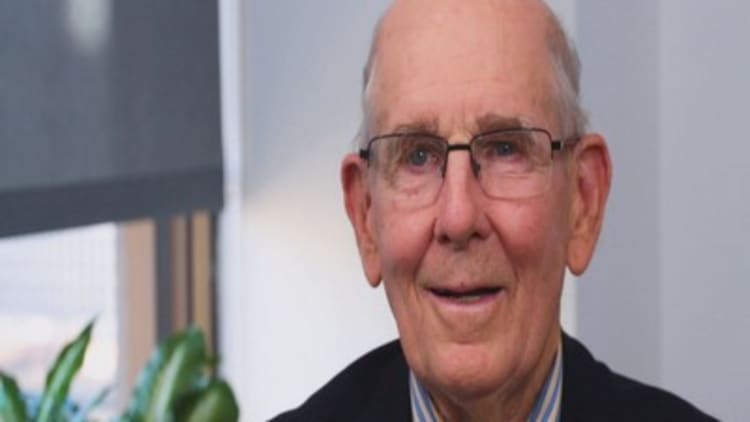BlackRock fixed income chief Rick Rieder said he does not believe the inverted yield curve is signalling a recession this time.
The flattening yield curve has been spooking markets, particularly this week when the Treasury yield slid below both the 3-year and yield, "inverting" the curve. The move was a signal to traders that the rest of the curve could also invert, as the more closely watched 10-year yield was just 9 basis points above the 2-year yield.
Stock index futures on Thursday pointed to more declines on the economic slowdown fears.
"Historically this inverting of the curve was not just the best barometer, it was the only barometer of a recession," said Rieder, BlackRock's chief investment officer of global fixed income. "Now, it's a function of the Fed that has the front end at elevated levels, and you're issuing a lot of debt."
Rieder said he does see the economy slowing, inflation should move lower, and he expects 2 percent growth next year.
"We're decelerating. We were running over 4 percent growth in the second quarter. You have this unbelievable tailwind of fiscal and tax policy. I don't think we're going into a recession in 2019, and I think it's questionable if you're going into a recession in 2020, but we are tangibly slowing," he said. "The interest sensitive part of the economy is slowing — mortgages, housing, small business lending are all slowing."
Trade war
While he doesn't see a recession, Rieder said, however, that could change if the U.S. truce with China ends with a renewed trade war with more tariffs.
"It would have an impact on growth and inflation. It's easy to see what it means for risk assets. They'll come under pressure. For rates, it's more ambiguous. It's going to pressure and lower growth. It will create a flight to quality....Ultimately, I think it will slow growth more than it will cause inflation," he said.
Rieder said there are signs inflation is slowing, and it should continue to slow over the next couple of months, in part because of the drop in oil prices.
"Part of why the softness has been over the last few months is companies pulling back that are concerned about capital expenditures. You've seen it...particularly in Europe, where the German auto data was horrendous. If you take off the risk of significant tariffs, sentiment will improve, and that's why I t hinkt he economy will be fine, if you get some form of tangible agreement on trade," he said.
The slowing economy, and lower rates for longer duration Treasurys, should help bring down mortgage rates. Rieder said mortgage rates have probably seen their highs and could move lower. The 30-year fixed rate rose above 5 percent briefly this fall, and have been just under that level. They are now about 4.82 percent.
Mortgages, and other consumer and business loans are closely linked to the bench mark 10-year Treasury yield. The 10-year yield was at about 2.91 percent Tuesday. Yields move opposite price.
"I don't think rates are going to move dramatically from where they are unless the economy slows significantly from here...but I could see the 10-year being in a range of 2.75 to 3.25 percent," Rieder said. "I think people are worried that growth falls faster."
Rieder said the U.S. economy is durable. "We're going to a 3.3 percent unemployment rate or maybe even lower than that. It's pretty hard to go into a recession if unemployment is going to reach 3 percent," he said.
Rieder has been expecting the Fed to pause in its rate hiking, some time next year, after it hikes rates in December. He expects a hike in December and one more next year, though the Fed has forecast a rate hike in December and three more next year. He said if the Fed does not pause, the markets will run into trouble.
The 2-year Treasury Tuesday was yielding about 2.81 percent, and the 5-year was at 2.79 percent. The bond and stock markets were closed Wednesday, due to the national day of mourning for President George H.W. Bush. Stock futures were firmer in the early Wednesday session, after Tuesday's sell off that sent the Dow down 799 points.
What spooked the market
The Treasury market has been particularly volatile in the past week, particularly after Fed Chairman Jerome Powell said the Fed was nearing neutral, the level where the fed funds future neither stimulates or stalls the economy. Neutral is seen as a level near where the Fed would stop or pause in its rate hiking.
The 10-year Treasury yield dipped below 3 percent just after Fed Chairman Jerome Powell spoke last week for the first time since Sept. 18. The 3 percent level is a psychological milestone that the 10-year has spent much more time below than above since the financial crisis. The move higher in September was seen as an important step into a new range, in reaction to Fed rate hiking.
"The 5-year is the fulcrum of how we think about the Fed's direction in the next few years. Part of what wigged the market out was the 5-year moving to the 2-year," he said.
Rieder said the surge in bond buying has come along with increased buying from Asia, and also pension funds, looking to lock in stock market gains and move to safer fixed income holdings. The move has been swift.
"I think this is a recognition the markets are pulling forward that the economy is softening, and the Fed is close to neutral. We can't be far from neutral, if not past it, with the housing market under the pressure it is," he said.
WATCH: How the Fed could cause the next recession, according to Gary Shilling



